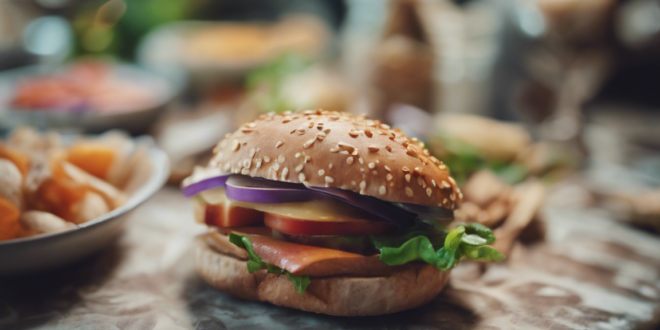The Healthier Eating Challenge: Discovering Delicious Alternatives to Ultraprocessed Foods
In today’s fast-paced world, ultraprocessed foods have become a staple in many American households. These convenient, shelf-stable products may seem like a quick solution to busy lifestyles, but they come with significant health risks that can no longer be ignored. This comprehensive guide will walk you through understanding ultraprocessed foods and provide practical, delicious alternatives that can transform your diet and overall well-being.
Understanding Ultraprocessed Foods: What Are They Really?
Ultraprocessed foods are industrial formulations made mostly from substances extracted from foods (oils, fats, sugar, starch, and proteins), derived from food constituents, or synthesized in laboratories. These products typically contain little to no whole food ingredients and are designed for maximum convenience and extended shelf life. Common examples include:
• Packaged snack foods
• Sugary breakfast cereals
• Soft drinks
• Frozen meals
• Processed meats
• Instant noodles
• Packaged baked goods
The Hidden Health Risks of Ultraprocessed Foods
Numerous scientific studies have linked ultraprocessed foods to a range of serious health concerns. Research published in prestigious medical journals has demonstrated connections between these foods and:
• Increased risk of obesity
• Higher rates of cardiovascular disease
• Elevated cancer risks
• Accelerated cognitive decline
• Compromised immune system function
• Disrupted metabolic processes
The Science Behind Food Processing
Not all processed foods are created equal. There’s a significant difference between minimally processed foods and ultraprocessed products. The NOVA food classification system, developed by researchers, helps consumers understand these distinctions:
1. Unprocessed or Minimally Processed Foods: Fresh fruits, vegetables, nuts, meats
2. Processed Culinary Ingredients: Oils, salt, sugar
3. Processed Foods: Canned vegetables, cheese, fresh bread
4. Ultraprocessed Foods: Packaged snacks, frozen meals, soft drinks
Practical Alternatives: Replacing Ultraprocessed Foods in Your Diet
Transitioning away from ultraprocessed foods doesn’t mean sacrificing flavor or convenience. Here are practical replacements for common ultraprocessed staples:
• Instead of Sugary Breakfast Cereals:
– Overnight oats with fresh fruits
– Homemade granola
– Chia seed puddings
– Plain yogurt with fresh berries
• Replace Packaged Snacks with:
– Fresh cut vegetables
– Homemade trail mix
– Roasted nuts
– Fresh fruit
– Hummus with vegetable sticks
Meal Preparation Strategies for Whole Food Eating
Successful dietary transformation requires strategic planning. Consider these meal preparation techniques:
1. Weekend Batch Cooking
• Prepare multiple meals in advance
• Store in portion-controlled containers
• Ensure quick, healthy options throughout the week
2. Smart Grocery Shopping
• Shop the perimeter of the grocery store
• Focus on fresh produce, meats, and dairy
• Read ingredient labels carefully
• Choose products with minimal ingredients
Budget-Friendly Whole Food Alternatives
Contrary to popular belief, eating whole foods doesn’t have to be expensive. Smart strategies include:
• Buy seasonal produce
• Purchase frozen fruits and vegetables
• Use bulk bins for grains and legumes
• Compare prices at local farmers markets
• Consider community-supported agriculture (CSA) programs
The Psychological Impact of Dietary Changes
Transitioning to whole foods isn’t just a physical journey but a psychological one. Be patient with yourself and implement changes gradually. Consider these mental health strategies:
• Start with small, manageable substitutions
• Celebrate incremental victories
• Join supportive online communities
• Track your progress and energy levels
• Practice mindful eating techniques
Navigating Challenges and Setbacks
Dietary changes are rarely linear. You might experience:
• Initial cravings for processed foods
• Social pressures
• Time management challenges
• Temporary discomfort
The key is persistence and self-compassion. Remember that every whole food choice is a step toward better health.
Long-Term Health Benefits
By reducing ultraprocessed food intake, you can potentially:
• Improve metabolic health
• Enhance cognitive function
• Boost immune system resilience
• Maintain healthy body weight
• Reduce inflammation
• Increase overall energy levels
Conclusion: Your Path to Healthier Eating
The journey away from ultraprocessed foods is a profound act of self-care. It’s not about perfection but consistent, mindful choices. Start small, be patient with yourself, and remember that every whole food meal is an investment in your long-term health and well-being.
Embrace this challenge as an opportunity for transformation, not deprivation. Your body, mind, and future self will thank you.
 Good Calories Guide GoodCalories Guide focuses on nutrition, healthy eating, and overall wellness. The site offers practical insights into evidence-based dietary practices, including tips for specific lifestyles such as veganism, keto, and family-friendly meal planning. It also addresses unique nutritional needs for individuals with conditions like diabetes or food allergies, while providing quick and accessible recipes to make healthy living a sustainable and enjoyable choice.
Good Calories Guide GoodCalories Guide focuses on nutrition, healthy eating, and overall wellness. The site offers practical insights into evidence-based dietary practices, including tips for specific lifestyles such as veganism, keto, and family-friendly meal planning. It also addresses unique nutritional needs for individuals with conditions like diabetes or food allergies, while providing quick and accessible recipes to make healthy living a sustainable and enjoyable choice.


